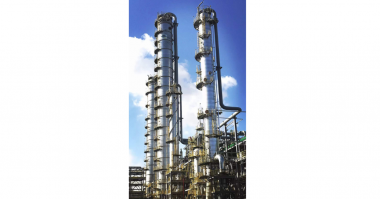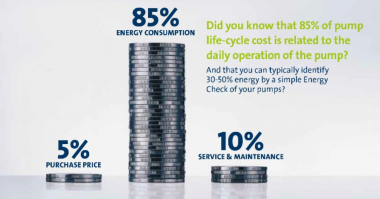How can Life Cycle Management strengthen the life of a pump or pumping system?
Life cycle management can be interpreted in many ways. The best way to maximize the life of a pump or pumping system begins with design. It is important to understand the current and future expectations of the pump or pumping system and design to that specification from the start.
What type of training programs are available to learn these programs?
Routinely, software workshops are provided for learning the mechanics of using any design/analysis software for various types of pumps. Such workshops normally provide exposure to basic turbomachinery theory and an introduction to associated component performance prediction approaches and associated loss correlations and modeling parameters. While the availability of CAE software may not be new to pump designers, it is also important that the engineers (particularly those new to pump design) undertake hydraulic design courses to learn more about the full aero-mechanical design process, the hydraulic design goals and associated parameters for each step in the design process and the influence of both mechanical and manufacturing factors on hydraulic performance aspects. Having long term design success (e.g. experience and a track record) for a range of pumps covering a wide span of pump specific speeds and sizes, component types and architecture and using a consistent design approach and philosophy are of the greatest benefit. Concepts NREC offers a number of education programs including our Design Software Workshops where we provide hands-on training in the latest versions of the Agile Engineering Design System® for axial and radial turbomachines. These workshops typically draw a diverse and active group of both experienced and new turbomachinery designers who want or need to be current in this versatile, powerful, state-of-the-art turbomachinery design and analysis software. We also offer a number of engineering courses throughout the year focused on optimizing design and improving performance of turbomachinery including pumps as well as several webinars devoted to the topic.
Can we use CAE/CAM software to design better pumps?
Yes, most certainly, the availability of suitable design/analysis software can provide the basis for improved pump designs by allowing a wider range of design choices to be explored prior to committing to hardware. However, it is the advent of fully integrated design/analysis systems that recognize all important engineering aspects of the design process (hydraulics, stress vibration, seals and bearings, rotor dynamics and associated manufacturing realities) that will yield successful designs and enable the design cycle time and costs to be significantly reduced. Additionally, fewer candidate prototype designs will need to be tested leading to further significant cost reductions and shortened project delivery times. Another very important ingredient for performance success in applying CAE systems is that significant validation be carried out for each level of hydraulic performance tool (e.g. both meanline and CFD). This requires that there is a rich data base of prior successful designs that can be used to validate various component modeling and associated correlations.
Do you need a problem pump to begin the process?
No, it is not essential that a problem pump be used as the starting point for a new design. Some design systems can begin from the required basic pump design specifications with desired NPSH and off design performance characteristics along with any geometric, geometric envelope and manufacturing limitations. Having prior designs available for similar specific speed and size (and other parameters) is certainly useful to guide the final design details, but that prior design data base should have already been used as part of the validation process for the design/analysis system in use.
Dr. Colin OsborneAll industries can benefit from CAE tools: Medical pumps, industrial, process, consumer, automotive, aerospace pumps, and more. Every industry is striving to design the most efficient pumps for respective applications and in the shortest possible design cycle times. CAE tools can help them achieve this.
Which industries have you seen benefit the most from these solutions?
All industries can benefit from CAE tools: Medical pumps, industrial, process, consumer, automotive, aerospace pumps, and more. Every industry is striving to design the most efficient pumps for respective applications and in the shortest possible design cycle times. CAE tools can help them achieve this.
How can pump designers validate virtual test results more effectively?
It is most important that adequate validation be carried out for each hydraulic design step (e.g. using either meanline or full 3 D CFD methods) in order to have confidence in applying design/analysis systems so they will yield good designs with assurance of meeting predicted performance aspects with actual hardware (and with minimal number of prototypes). To do this effectively requires not only overall performance data for a range of specific speeds, sizes and component types, but most importantly tests with additional measurements (mostly static pressures) at the inlet and discharge of each component (impeller, diffuser and volute or return channel) in order to yield component performance characteristics but also direct determination of modeling parameters using in the prediction correlations and approaches.
About the Author:
Dr. Colin Osborne is Concepts NREC’s senior vice president of software and chief engineer. He is a well known expert in turbomachinery having worked in the industry for nearly 40 years. He has authored hundreds of technical reports and he lectures on the topic at universities and businesses all over the world.
In his previous experience, Dr. Osborne worked at Creare R&D, where he performed many different technical tasks in turbomachinery, mainly in centrifugal compressors. He also worked as Manager of Analysis Engineering at Dresser-Rand, where he was responsible for all aerodynamic, rotordynamic, and structural design/analysis for radial and axial machines and gas turbines. He also was Centrifugal Compressor Manager for Textron Lycoming, where he had overall responsibility for the design, development, and research related to centrifugal compressors.
Dr. Osborne holds a Bachelor’s Degree from the Aeronautics Department of Imperial College, London, England, an S.M. degree from the Aerospace Engineering Department of Massachusetts Institute of Technology, and a Ph.D. degree from the Aerospace Engineering Department of Cornell University. His doctoral work involved the development of theories for unsteady compressible flow over blades.




Comments